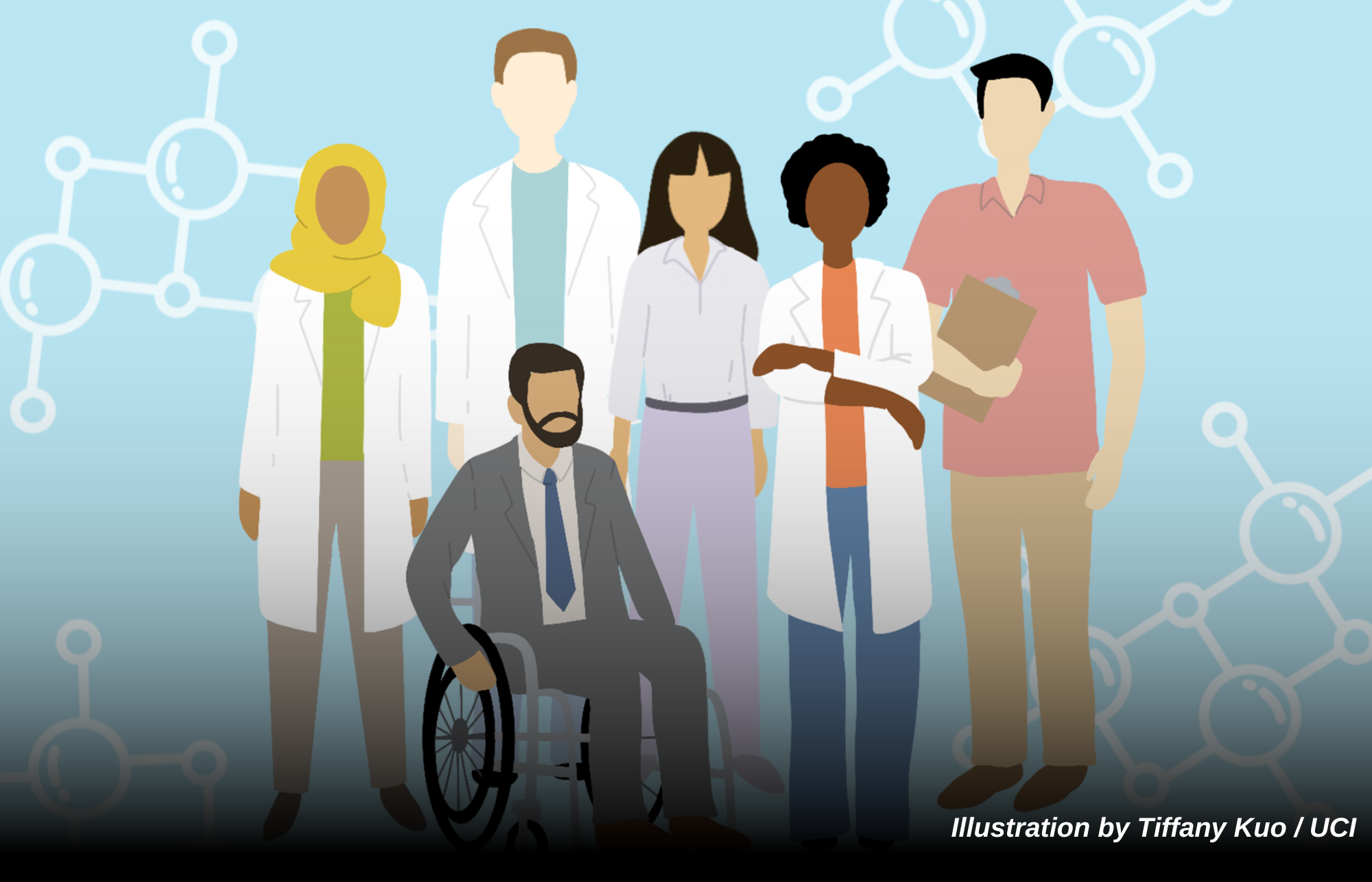UC Irvine Physical Sciences a leader in diversity, equity and inclusion work

UC Irvine is one of the only universities to participate in all three bridge programs of the Inclusive Graduate Education Network. The programs aim to create a pathway for underrepresented minority students to matriculate into Ph.D.-granting institutions like UCI.
The UC Irvine School of Physical Sciences has many programs aimed at helping the school – and UCI overall – foster a more diverse, equitable and inclusive environment.
A new study published in the Journal of Women and Minorities in Science and Engineering reports that UCI is top among universities when it comes to DEI efforts. The paper cites the success of the UCI Department of Physics & Astronomy and its participation in the Cal-Bridge program, which works to create a pathway for underrepresented minority (URM) students from California state universities to matriculate into Ph.D.-granting institutions like UCI. Cal-Bridge does this by facilitating trust-building between prospective URM doctoral students and doctoral institutions, and by broadening access, participation and inclusion in the UCI Physics & Astronomy Ph.D. program.
UCI tops the list of the seven Cal-Bridge-participating institutions analyzed in the study, thanks primarily to efforts of faculty, students and staff the UCI Department of Physics & Astronomy.
“What this case study illustrates is that trust-building between faculty and students can result in broader cultural shifts related to DEI initiatives,” said Cynthia D. Villarreal, who’s the lead author of the report and a professor at Northern Arizona University. “The partnership that was formed between UCI and Cal-Bridge brokered trust that then led to shifts in their admissions process and program culture.”
Trust-building, Villarreal explained, involves helping underrepresented students with steps like networking with faculty at prospective graduate schools, or acquiring a letter of recommendation from a respected voice in the field they want to pursue.
“So often in professional networking situations, you hear ‘It’s not what you know, it’s who you know,’ and to an extent, that’s always been a part of the hidden curriculum of graduate education,” said Villarreal. “It’s hidden because it’s not information that is always communicated to students who are first-generation or those whose identities are underrepresented in STEM.”
Villareal and her team used a two-phase analytic method of social network analysis and qualitative interviews to identify the forces that drive social connections and patterns. The analysis helped the authors discover how prospective graduate students “made judgments and decisions based off the conversations they had with faculty and advanced Ph.D. students,” said Villarreal. “So, earning the top ranking in this report says quite a bit about the overall culture and the environment at UCI.”
Two recent Ph.D. graduates from the UCI Department of Physics & Astronomy, Katy Rodriguez Wimberly and Manuel Paul, came to UCI via Cal-Bridge. Both went on to become professors after completing their doctoral training; Rodriguez Wimberly is now a professor at CSU San Bernardino, and Paul is a professor at Cosumnes River College in Sacramento.
“The greatest impact Cal-Bridge had on me was through creating and expanding a trusted network of amazing – and caring – scientists,” said Rodriguez Wimberly. “As a first-generation student, the trust my official and unofficial Cal-Bridge mentors built with me opened up that ‘hidden curriculum’ – something I would not have been aware of otherwise.”
While she was a Ph.D. student at UCI, Rodriguez Wimberly, alongside former doctoral student Arianna Long, co-founded the Physics & Astronomy Community Excellence (PACE) program, which aims to help new doctoral students navigate the often-uncertain first year of graduate school.
Rodriguez Wimberly and Paul are the first UCI Cal-Bridge scholars to go on to become professors.
“I was very pleased and really excited to see the study,” said Professor Mu-Chun Chen, associate dean of diversity, equity and inclusion for the School of Physical Sciences. “The department has been working really hard on this aspect for many years.” Chen believes the willingness of the members of her department to enact the kinds of changes that build trust networks is part of the reason UCI is emerging as a model for DEI efforts like Cal-Bridge. “The results have given me hope that we’re on the right track,” Chen said.
“It's not surprising to anyone familiar with the program that the leading institution turned out to be UCI,” said Bruce Schumm, a professor of physics at UC Santa Cruz and the director of Cal-Bridge at UCSC who was not involved in the study. “The conclusion that trust networks are central to Cal-Bridge's approach and its success resonates strongly with me, and strongly reflects my own personal experience.”
Chen hopes for the success of Cal-Bridge at UCI – in particular, its emphasis on building a trust-building culture – to expand to other departments at the School of Physical Sciences. The UCI Department of Mathematics just admitted its first Cal-Bridge scholar, while the Department of Chemistry and the Department of Earth System Science are already active participants in bridge programs run by the American Chemical Society and the American Geophysical Union, respectively. In addition to Cal-Bridge, the Physics & Astronomy department participates in the American Physical Society Bridge Program, making UCI one of only two institutions that participates in all three societal bridge programs comprising the Inclusive Graduate Education Network. These programs provide different types of support for students from marginalized backgrounds and allow the school to expand its DEI impacts.
And the key to making it work, it seems, is fostering trust.
“My network and the support they give me has enabled me to create the career of my dreams: doing excellent astrophysics research, contributing to an equitable and inclusive STEM community through mentorship work and research, and staying in Southern California to be near my family,” said Rodriguez Wimberly. “Since I became a Cal-Bridge scholar, my UC mentor – an astrophysics professor at UCI – and many other UCI faculty working in Cal-Bridge, have encouraged me, supported me and joyfully celebrated my wins.”
